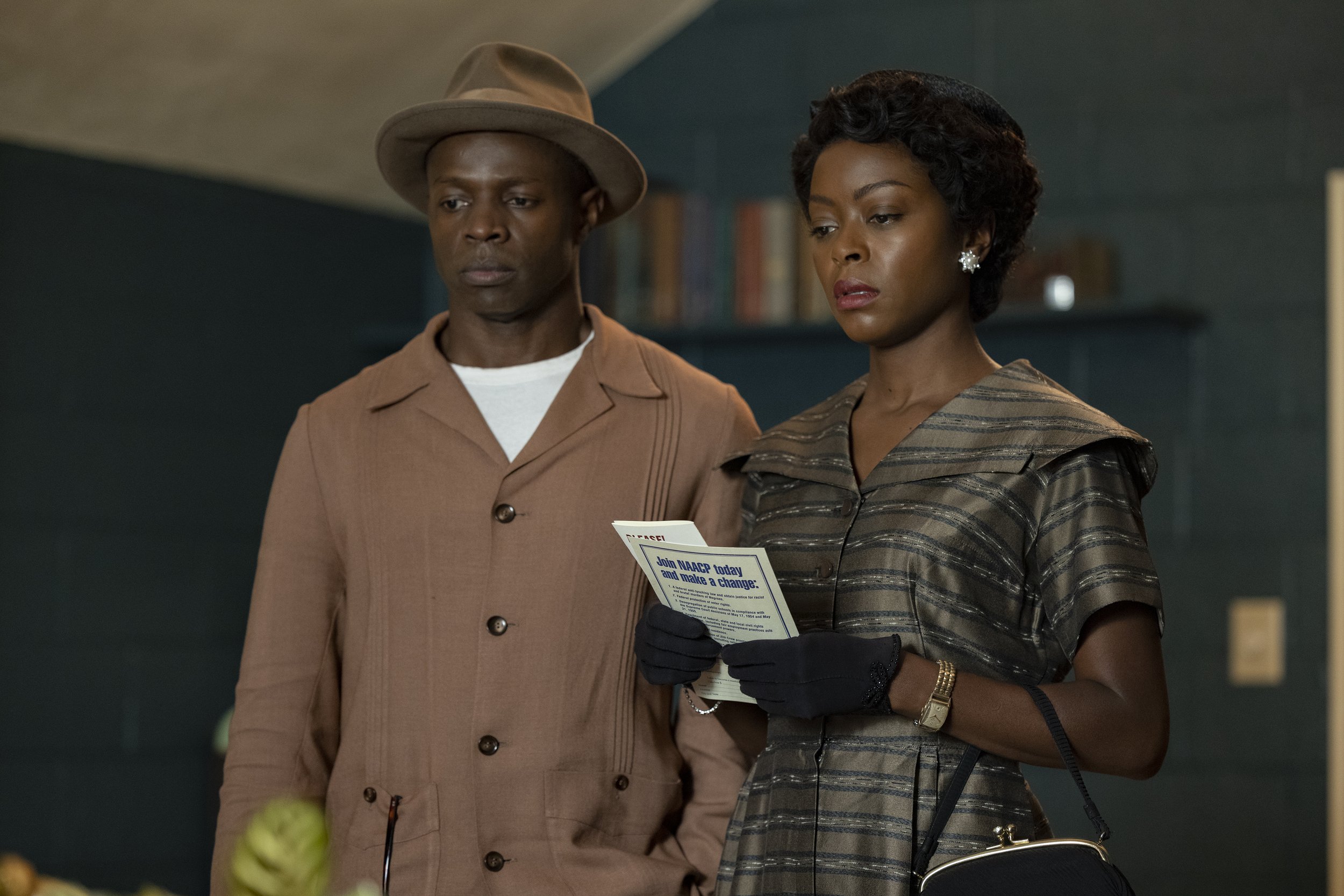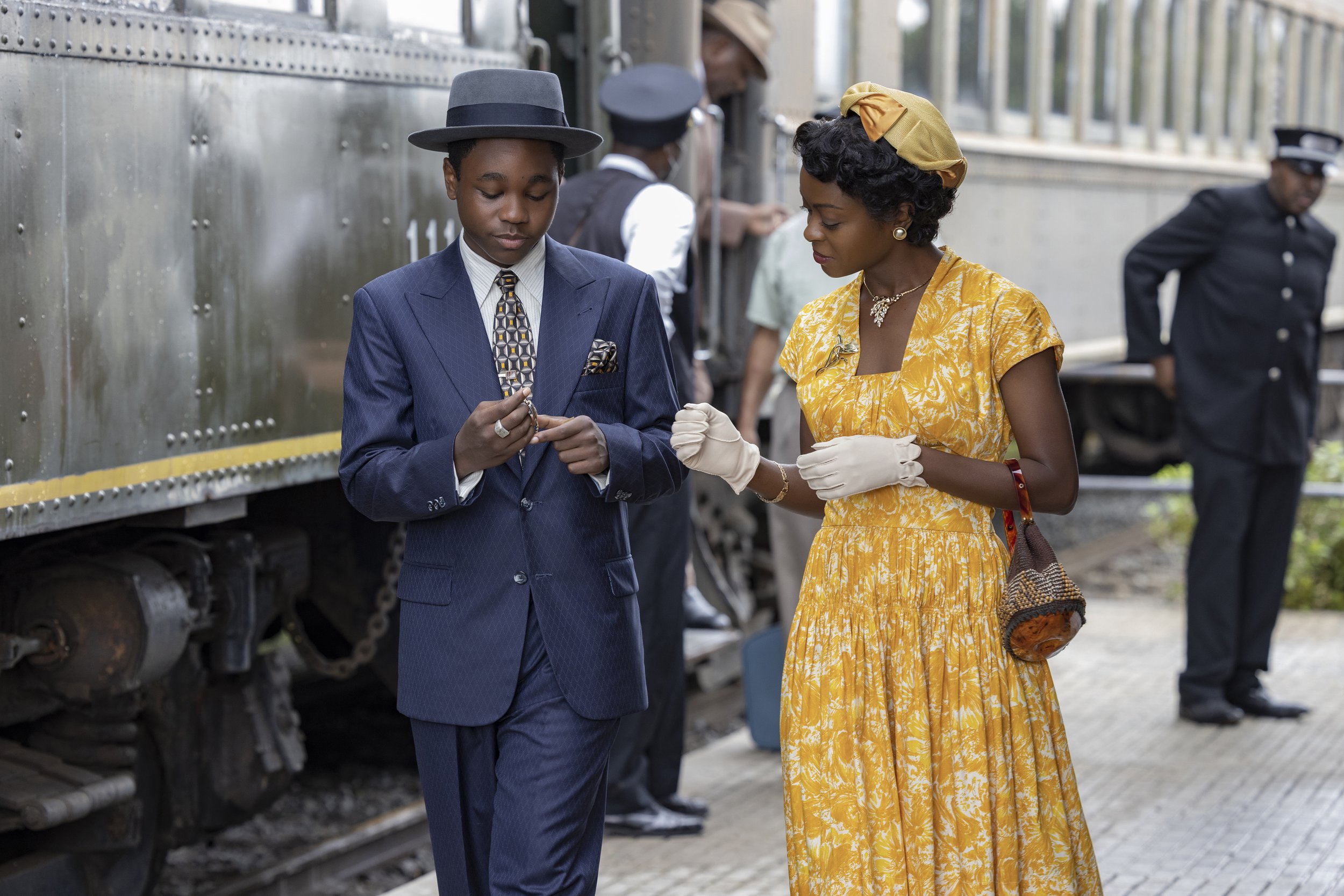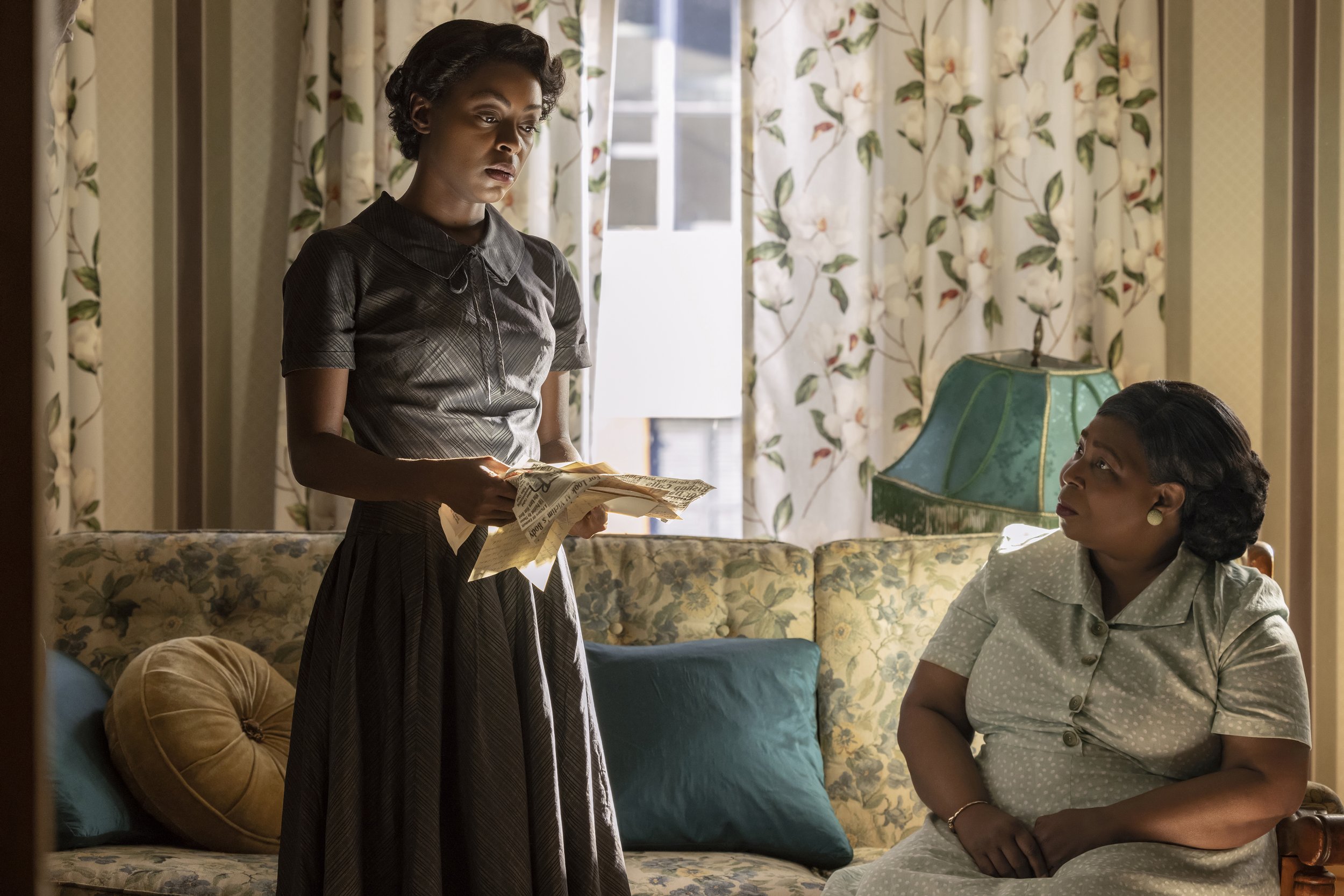MOVIE REVIEW: Till
TILL– 4 STARS
LESSON #1: A MOTHER’S WORRY– Till is a heartbreaking and meaningful film presented almost entirely through a mother’s point of view. Any mother of any background will tell you that one of, if not, the most ever-present emotions is worry. Debilitating considerations and worst case scenarios often percolate and betray otherwise happy thoughts and sweet moments. All too often, it’s a mental gear that cannot easily be turned off. One of those flustering pauses begins the film and an agonizing tone for Till is set right away.
In the opening scene, Mamie Till (Danielle Deadwyler of The Harder They Fall) and her teenage son Emmett (newcomer Jalyn Hill) are singing along to a ballad on the radio while driving through Chicago. The song is the lovely “Sincerely” by The Moonglows and its sweet lyrics warm the storge love between them. Without warning, the moment of casual bliss is broken by a sharp, short sensation of worry imagined by the mother. We don’t see what she’s thinking, but the sound design warps the song and the camera loosens to show Mamie’ composure broken ever so slightly as they reach their destination.
Very soon, we learn the roots of her worry. Begun as an encouraging suggestion from her mother Alma (Academy Award winner Whoopi Goldberg) and supported by her significant other Gene Mobley (Save the Last Dance’s ageless Sean Patrick Thomas), Emmett will soon be making a trip to stay a few weeks with extended family in Money, Mississippi. The slightly more tolerant urban Midwest is all the bright boy and stutterer knows.
LESSON #2: BE SMALL WHEN NECESSARY– As Mamie laments, Emmett has never known true fear. With a stern eye, she repeatedly implores to her son before this trip to understand the different rules he will enter when it comes to the deep American South of 1955. She distills her warnings down the unifying direction of “be small.” She knows getting noticed brings trouble, especially to a boy like Emmett who is gregarious to a fault.
As unfolded history in Till will show us, Emmett would not survive to see his mother or his Chicago home again. After a cross incident with a married white shopkeeper named Carolyn Bryant (Haley Bennet of The Girl on the Train), Emmett Till was kidnapped from his uncle Mose’s (TV veteran John Douglas Thompson) home in the middle of the night. He was tortured, mutilated, lynched, and dumped into the Tallahatchie River.
Thanks in part to the involvement of the NAACP, Emmett’s death was given national attention. The burning fuse of fear and prayer that encompassed Till has exploded into a spectacle born from tabloid death. The multi-layered support of the NAACP–embodied in the film by Spike Lee good luck charm Roger Guenveur Smith as Dr. T. R. M. Howard, Doctor Who’s Tosin Cole as Medgar Evers, and Kevin Carroll of Let the Right One In as Rayfield Mooty–was the right push under the wrong circumstances as a general public of ostriches with their heads in the sand needed the prodded shock while those emerging political leaders of the Black community sought to make lynching a federal crime.
LESSON #3: MAKE PEOPLE SEE– Through it all, Mamie Till was uncomfortably front and center as the grieving mother. Flashbulbs popped as she wailed and clutched the box containing her son’s body being offloaded from a train back in Chicago. The appalling and gut-wrenching imagery would multiply when Mamie insisted on an open-casket funeral and allowed a Jet magazine photographer to publish photos of her son’s mangled face for all to see. It shouldn’t take the horrific, scarred truth to change public sentiment, but it surely works like a sledgehammer to heart. The power of photographs from journalists has changed the attitude and course of history time and again. This, soberingly and in an excruciating fashion, was one of those moments.
LESSON #4: A MOTHER’S POWER– There’s a tectonic shift of strength orchestrated by Clemency director Chinonye Chukwu at Mamie’s lowest moment when she is viewing her son’s body in the morgue. She has asked to be alone and her breath-stealing tears begin to subside. Mamie longingly looks over the contours of her son’s body. True to the maternal bond between mother and son, the woman knows every inch, every curve, and every blemish, even in this disfigured state. The poignant musical score, easily one of the year’s best, from Abel Korzeniowski (Nocturnal Animals) rises when she does. With a line not long later from Deadwyler of “You’re not just my boy anymore,” a new resolve has been forged, and Till shifts to display the arduous quest for justice that followed.
Till is a mother’s story through and through and rarely ever leaves the lead actress’s pendulum of steadiness and trembles. Cinematographer Bobby Bukowski (Arlington Road) stays on Danielle Deadwyler like a microscope. You are wholly absorbed by her eyes and the poise that she uses to compose Mamie Till’s hardships, memories, unbroken faith, and brave will. Deadwyler is at her most powerful during scenes of stillness that maximize pause, absorption, and reflection. Chukwu, utilizing Ron Patane’s editing to the fullest, often arrives before interactions and stays a beat or two after to catch catalysts and ripples.
Worthy of high appreciation from a cinematic storytelling standpoint, Chinonye Chukwu was adamant about not displaying physical pain meted out to Black characters in her film. Her assertion that too much has been shown and exploited before was a correct choice. The resulting mood is a remarkable dramatic effect, as a viewer’s imagination is guided enough by dialogue of testimony or, in what is always more affecting, their own imagination of fearing and picturing the worst. The mournful tears and shuddered thoughts come easily on their own, and more historical films of inhumane trauma should follow this film’s lead. The preeminent deliverer of those tears and thoughts is the tremendous Danielle Deadwyler.
LESSON #5: ACTION AND CHANGE HAVE TAKEN TOO LONG– As a final note, the topical history that echoes from this 67-year-old murder remains resonate and chilling to say the least. No one anywhere should die as Emmett did, especially a child. Black leaders knew the long game then in the 1950s, yet one must ask how far the country has progressed since the aftermath of Emmett Till. Point of fact, it took a century and over 200 attempted bills before 47th President Joe Biden signed the Emmett Till Anti-Lynching Act in March 2022 designating lynching a federal hate crime. Folks, that is 67 years too long and 67 years too late, and we know it. Till is an empowering reminder that sufficient action and change are not over.
LOGO DESIGNED BY MEENTS ILLUSTRATED (#1072)











